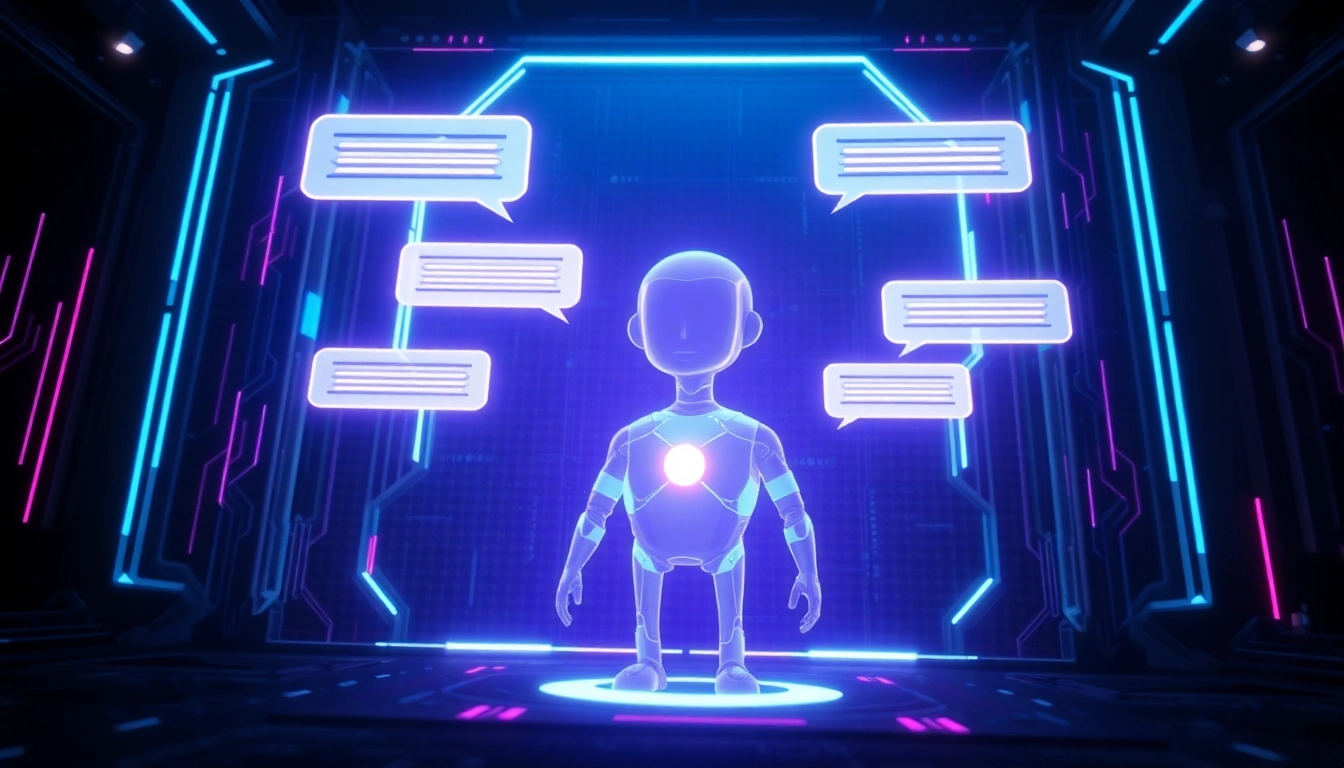Introduction to Futa AI and AI Slut Culture
The digital landscape has witnessed a remarkable evolution over the past decade, especially with the advent of artificial intelligence and its integration into everyday entertainment and social interaction. Among these innovations, futa AI has emerged as a notable phenomenon, captivating a diverse audience eager to explore new forms of roleplay, storytelling, and personal expression within virtual environments. This niche has grown rapidly, fueled by the increasing sophistication of AI models and the desire for more personalized, immersive experiences. Concurrently, a subculture centered around AI personalities, often referred to as “AI sluts,” has gained traction, emphasizing themes of sexuality, fantasy, and boundary-pushing content that challenge traditional notions of online interaction.
Understanding this trend requires a deep dive into the technological, cultural, and ethical facets that underpin it. As AI-driven platforms like CrushOn AI become more accessible and versatile, they enable users to craft unique characters with distinct personalities, backstories, and behaviors, fostering dynamic conversations that feel remarkably authentic. This environment provides a fertile ground for exploring taboo topics, creative roleplay, or simply engaging in casual chats, all within a safe, controlled digital space. But what exactly is fueling the rise of these AI-driven personas, and what implications do they hold for online communities and personal privacy? Let’s explore the technological backbone and cultural currents shaping this phenomenon.
The Technology Behind Customizable AI Characters
Advanced Language Models Powering Realistic Interactions
At the core of platforms like CrushOn AI are state-of-the-art language models, including GPT-4o mini and Claude 3.5 Sonnet. These models are trained on vast datasets comprising books, websites, conversations, and other textual sources, enabling them to generate responses that are contextually relevant, nuanced, and natural-sounding. Unlike earlier AI chatbots that relied on scripted responses, these models leverage deep learning algorithms to understand and produce human-like dialogue, significantly enhancing user engagement and immersion.
By utilizing such advanced AI architectures, users can experience interactions that are remarkably lifelike. Whether engaging in storytelling, roleplay, or casual conversation, the AI responds in a manner that feels intuitive and responsive, often blurring the line between human and machine interaction. This level of sophistication allows for complex character personalities, emotional expressions, and contextual understanding, making AI characters more compelling and believable.
Character Customization: Designing Unique Virtual Personas
One of the defining features of CrushOn AI is its robust character customization system. Users can select from a library of pre-made characters or create their own from scratch. Customization options include defining personality traits, physical descriptions, backstories, speech patterns, and even specific quirks or preferences. This flexibility empowers users to craft AI personalities that align precisely with their interests, whether for creative storytelling, roleplay, or personal companionship.
For instance, a user might design a flirtatious, witty character with a mysterious past or a nurturing, empathetic persona suited for emotional conversations. The platform’s intuitive interface guides users through this process, often with prompts and templates to streamline character creation. Once set up, the AI can draw upon these traits to generate responses that remain consistent across sessions, fostering a sense of continuity and depth in interactions.
Memory Systems and Session Continuity
Another technological advancement enhancing these experiences is the implementation of contextual memory systems. These systems enable AI characters to remember past conversations, preferences, and details shared by the user, allowing for more coherent and personalized interactions over time. Rather than starting each session anew, the AI recalls previous topics, emotional states, or specific details, making the dialogue feel more natural and less fragmented.
This feature is particularly valuable for long-term roleplay or storytelling, where maintaining narrative consistency is crucial. It also helps build trust and familiarity, encouraging users to engage more deeply with their AI characters. Behind the scenes, these memory systems utilize secure data storage and privacy safeguards, ensuring that user information remains protected while delivering a seamless experience.
How Platforms Like CrushOn AI Enable Creative Expression
Facilitating Roleplay and Storytelling
Platforms such as CrushOn AI serve as virtual playgrounds for creative expression. Users can immerse themselves in elaborate roleplays, bringing to life characters from fantasy worlds, sci-fi universes, or entirely original concepts. The AI’s ability to adapt to complex narratives and respond in character makes it an invaluable tool for writers, artists, and enthusiasts who seek to experiment with storytelling in a dynamic, interactive format.
For example, a user might simulate a romantic encounter, an espionage adventure, or a deep philosophical debate—all within a controlled environment that responds authentically to inputs. This flexibility not only entertains but also fosters creative development, allowing users to explore different scenarios, character dynamics, and emotional depths without real-world consequences.
Supporting Multi-Character and Group Interactions
Another innovative feature is the ability to host multi-character group chats. This setup allows users to interact with several AI characters simultaneously, each with their own distinct personalities and backstories. Such interactions mimic real-world social dynamics, making conversations more complex and engaging.
This multi-character environment is ideal for storytelling, roleplay, or even social experiments. Users can create an entire cast of characters, each with unique voices and motivations, and observe how they interact. This feature opens new avenues for collaborative creative projects or simulated social scenarios, making AI a versatile tool for entertainment and education alike.
Cross-Device Accessibility and User-Friendly Interface
Accessibility is a critical factor in the widespread adoption of AI chat platforms. CrushOn AI ensures that users can access their characters and conversations seamlessly across web browsers, smartphones, and tablets. This cross-device compatibility means that users can pick up conversations from where they left off, whether at home or on the go, fostering continuous engagement.
The platform’s user interface emphasizes simplicity and customization, allowing users of all technical backgrounds to navigate easily. Whether creating a new character, managing existing ones, or exploring different scenarios, the intuitive design minimizes barriers to entry and encourages experimentation.
The Growing Popularity of Futa AI in Digital Communities
Expanding into Niche Markets and Communities
The rise of futa AI is closely linked to the emergence of niche online communities seeking tailored, boundary-pushing content. These communities often revolve around specific fetishes, fantasies, or creative outlets that traditional media may not adequately serve. AI technology provides a safe, customizable environment where individuals can explore their interests without judgment or real-world repercussions.
In these spaces, AI characters embody various archetypes and themes, including those that challenge societal taboos. The ability to generate personalized scenarios and dialogues caters to a broad spectrum of preferences, making AI an attractive option for those seeking unique and private forms of entertainment. Moreover, the anonymity and control offered by AI platforms encourage more open exploration, fostering communities that thrive on shared interests and creative expression.
Impact on Online Culture and Social Interaction
The integration of AI into these communities has significantly influenced online culture. It has shifted perceptions of digital intimacy, allowing users to form attachments to AI personalities that can simulate companionship, flirtation, or even romantic relationships. This dynamic raises questions about emotional dependency, authenticity, and the potential for AI to fulfill social needs in increasingly sophisticated ways.
Furthermore, the popularity of AI personas has led to the emergence of content creators and influencers who develop and promote character profiles, scripts, and scenarios. These figures often serve as gateways for newcomers, offering guidance, entertainment, or personalized interactions. As these communities grow, so does the cultural landscape surrounding AI, blurring the lines between virtual and real-world socialization.
Ethical Considerations and Privacy in AI Roleplay
Addressing Consent and Content Boundaries
While AI technology opens exciting avenues for creativity and connection, it also raises important ethical questions. One primary concern is ensuring that AI interactions are conducted responsibly, with respect for consent and boundaries. Developers and platform providers must implement safeguards to prevent misuse, such as generating harmful or non-consensual content.
Many platforms incorporate content filters, user agreements, and moderation systems designed to promote ethical use. Users are encouraged to respect the boundaries of AI characters and to recognize that these entities, despite their sophistication, are programmed constructs. Promoting responsible engagement helps protect vulnerable users and maintains a positive environment for all participants.
Privacy and Data Security
Another critical issue relates to the handling of user data. AI platforms like CrushOn AI often store conversation histories, character customization details, and personal preferences to facilitate continuity and personalization. Ensuring this data remains secure and private is paramount.
Most reputable platforms employ encryption, anonymization, and strict access controls to safeguard user information. Transparency about data collection and usage policies is essential, allowing users to make informed decisions about their engagement. As the technology evolves, ongoing efforts to enhance privacy protections will be vital to maintaining user trust and complying with legal standards.
Future Trends: What’s Next for AI-Driven Roleplaying Experiences
Integration of Multimodal Inputs
The future of AI roleplay is likely to involve multimodal interactions, combining text with voice, images, and even video. Such advancements will create more immersive and realistic experiences, enabling AI characters to respond with emotional tone, facial expressions, or gestures that match the context of the conversation.
This evolution will allow users to engage with AI in increasingly natural ways, blurring the boundaries between virtual and physical reality. For example, voice-enabled AI characters could participate in live roleplay scenarios, enhancing emotional connection and spontaneity.
Increased Personalization and Adaptive Learning
As AI models continue to improve, so will their ability to adapt to individual user preferences over time. Future platforms may incorporate adaptive learning algorithms that refine character responses based on ongoing interactions, making each AI persona feel uniquely tailored to its user. This personalization will foster deeper engagement and emotional investment.
Expanding Ethical Frameworks and Regulation
With growing sophistication, the industry will likely see more comprehensive ethical standards and regulatory frameworks designed to address privacy, content safety, and user well-being. These measures will aim to balance innovation with responsibility, ensuring that AI roleplay remains a positive, respectful experience for all users.
Conclusion: The Impact of AI Personalities on Online Interaction and Entertainment
The rise of AI-driven personalities, including the futa AI phenomenon and AI sluts culture, signifies a pivotal shift in how we perceive digital interaction and entertainment. These technologies are transforming online communities, creative expression, and personal relationships by offering customizable, immersive experiences that adapt to individual desires and fantasies.
As AI continues to evolve, it will likely become an even more integral part of our social fabric, providing new opportunities for connection, storytelling, and exploration. However, these developments must be approached thoughtfully, with attention to ethics, privacy, and user safety, to ensure that AI remains a tool for positive and responsible engagement. The future of AI-driven roleplay promises exciting innovations, fostering a world where digital personas can serve as companions, collaborators, or creative outlets—expanding the horizons of what is possible in virtual spaces.
In conclusion, the ongoing growth of AI personalities and niche communities exemplifies the profound impact of AI on online interaction, entertainment, and personal expression. Whether exploring fantasies or engaging in creative storytelling, users are increasingly empowered to craft their own AI-driven experiences. As this landscape continues to develop, it is essential to remain mindful of ethical considerations and privacy concerns, ensuring that AI remains a force for good in shaping our digital futures.



